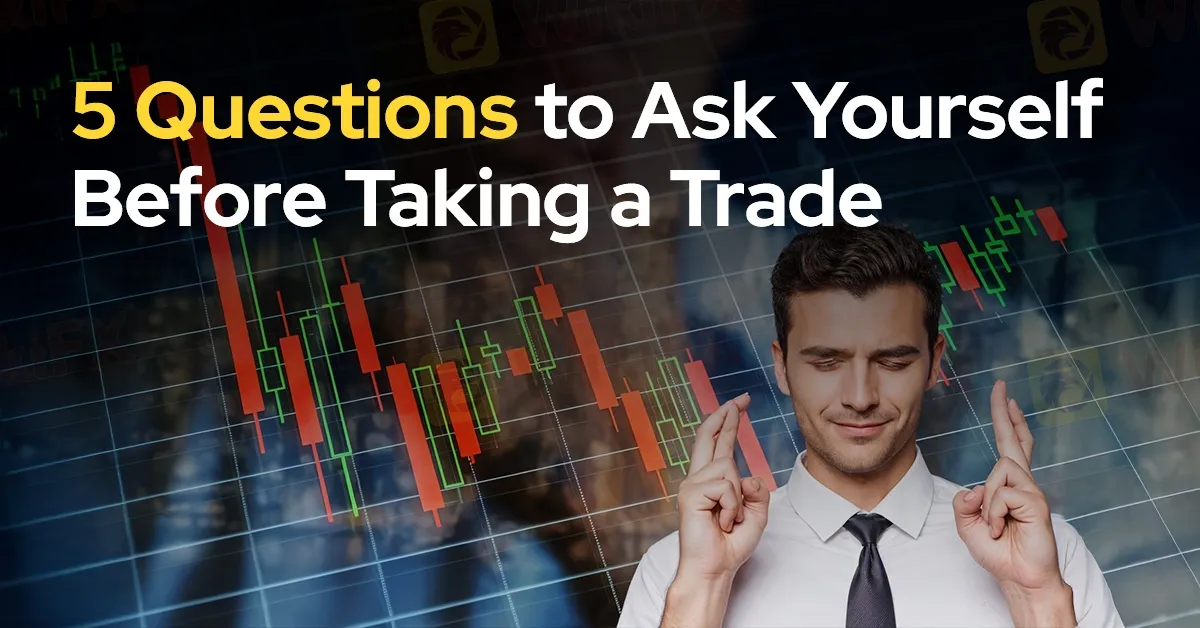简体中文
繁體中文
English
Pусский
日本語
ภาษาไทย
Tiếng Việt
Bahasa Indonesia
Español
हिन्दी
Filippiiniläinen
Français
Deutsch
Português
Türkçe
한국어
العربية
5 Questions to Ask Yourself Before Taking a Trade
Abstract:Before executing any trade, traders should pause and ask themselves critical questions to ensure they are making rational and well-informed decisions. Here are five questions to help you reflect on your strategy, manage risk, and control emotions before entering the market.

The allure of trading lies in its potential for financial gains, but the reality is that successful trading demands more than intuition or luck. It requires discipline, careful planning, and emotional control. Before executing any trade, traders should pause and ask themselves critical questions to ensure they are making rational and well-informed decisions. Here are five questions to help you reflect on your strategy, manage risk, and control emotions before entering the market.
1. Do I Have a Clear Trading Plan?
Every trade should be guided by a well-defined plan. Ask yourself if you have identified entry and exit points, set stop-loss and take-profit levels, and determined your position size. A clear trading plan helps eliminate impulsive decisions and provides structure. Without a plan, you are more likely to act on emotions, which can lead to unnecessary losses. A disciplined trader always follows their strategy, regardless of market noise.
2. Am I Prepared for the Risk Involved?
Trading is inherently risky, and no trade is guaranteed to succeed. Consider whether you are willing to accept the potential loss and how it fits within your overall risk management strategy. Experts recommend risking no more than 1-2% of your trading capital on a single trade. Ensure that the trade aligns with your risk tolerance and financial goals. Remember, trading is about preserving capital as much as it is about making profits.
3. What is My Emotional State Right Now?
Emotions are one of the biggest obstacles to consistent trading success. Before entering a trade, evaluate your mental and emotional state. Are you feeling stressed, overconfident, or desperate to recover from previous losses? Trading while emotionally unstable can lead to rash decisions and cloud your judgement. Take time to centre yourself and approach the market with a calm and focused mindset.
4. Have I Analysed the Market Thoroughly?
A hasty trade often stems from inadequate research. Reflect on whether you have conducted a thorough market analysis and checked for relevant economic or geopolitical events that could influence price movements. Understanding market conditions, trends, and technical indicators is crucial. Avoid relying on hearsay or impulsively acting on speculation. A well-researched trade is more likely to yield favourable outcomes.
5. What is My Exit Strategy?
Many traders focus solely on when to enter the market but fail to plan their exit. Ask yourself if you have a clear strategy for both winning and losing scenarios. Knowing when to exit a trade prevents you from holding onto losing positions for too long or cutting winning trades prematurely. An exit plan protects you from making decisions driven by greed or fear.

Trading requires patience, discipline, and a commitment to learning from both successes and failures. Rushing into trades without proper preparation can lead to costly mistakes. By asking yourself these five questions, you can approach the market with greater confidence and minimise emotional or impulsive actions.
Remember, trading is a marathon, not a sprint. Focusing on long-term consistency rather than short-term gains will pave the way for a more sustainable and successful trading journey.

Disclaimer:
The views in this article only represent the author's personal views, and do not constitute investment advice on this platform. This platform does not guarantee the accuracy, completeness and timeliness of the information in the article, and will not be liable for any loss caused by the use of or reliance on the information in the article.
Read more

Navigating the Intersection of Forex Markets, AI Technology, and Fintech
The financial world is transforming, driven by the rapid integration of artificial intelligence (AI) and innovative fintech solutions. This change is most apparent in forex markets, where algorithmic trading and deep learning are redefining strategies, risk management, and decision-making. In this article, we explore how AI-driven technologies are not only revolutionizing forex trading but are also propelling fintech innovations that enhance customer experiences, bolster security, and unlock new market opportunities.

The One Fear That’s Costing You More Than Just Profits
The fear of missing out (FOMO) is NOT what you think it is! Read the three lesser-discussed components that contribute greatly to FOMO trading!

Why More People Are Trading Online Today?
Discover why online trading is booming with tech, AI, and a push for financial freedom. From stocks to crypto, it’s a thrilling hustle for all.

High Return Traps? WikiFX’s Complete Scam-Busting Handbook to Avoid Financial Fraud!
Financial scams are evolving faster than ever, and fraudsters are getting more creative in luring victims into traps. Whether it’s promising high returns or leveraging authority to build trust, scammers continuously innovate new ways to trick investors. From clone firms to cold calling schemes, it’s essential to understand how these scams work to protect your hard-earned money. This comprehensive guide by WikiFX will help you recognize and avoid common financial scams.
WikiFX Broker
Latest News
Why Are Financial Firms Adopting Stablecoins to Enhance Services and Stability?
Experienced Forex Traders Usually Do This Before Making a Lot of Money
Octa vs XM:Face-Off: A Detailed Comparison
When High Returns Go Wrong: How a Finance Manager Lost RM364,000
Bridging Trust, Exploring Best—WikiEXPO Hong Kong 2025 Wraps Up Spectacularly
Interactive Brokers Expands Crypto Trading with Solana, XRP, Cardano, and Dogecoin
Fidelity Investments Explores Stablecoin Innovation in Digital Assets Sector
Why More People Are Trading Online Today?
SEC Ends Crypto.com Probe, No Action Taken by Regulator
Broker Comparison: FXTM vs XM
Currency Calculator







